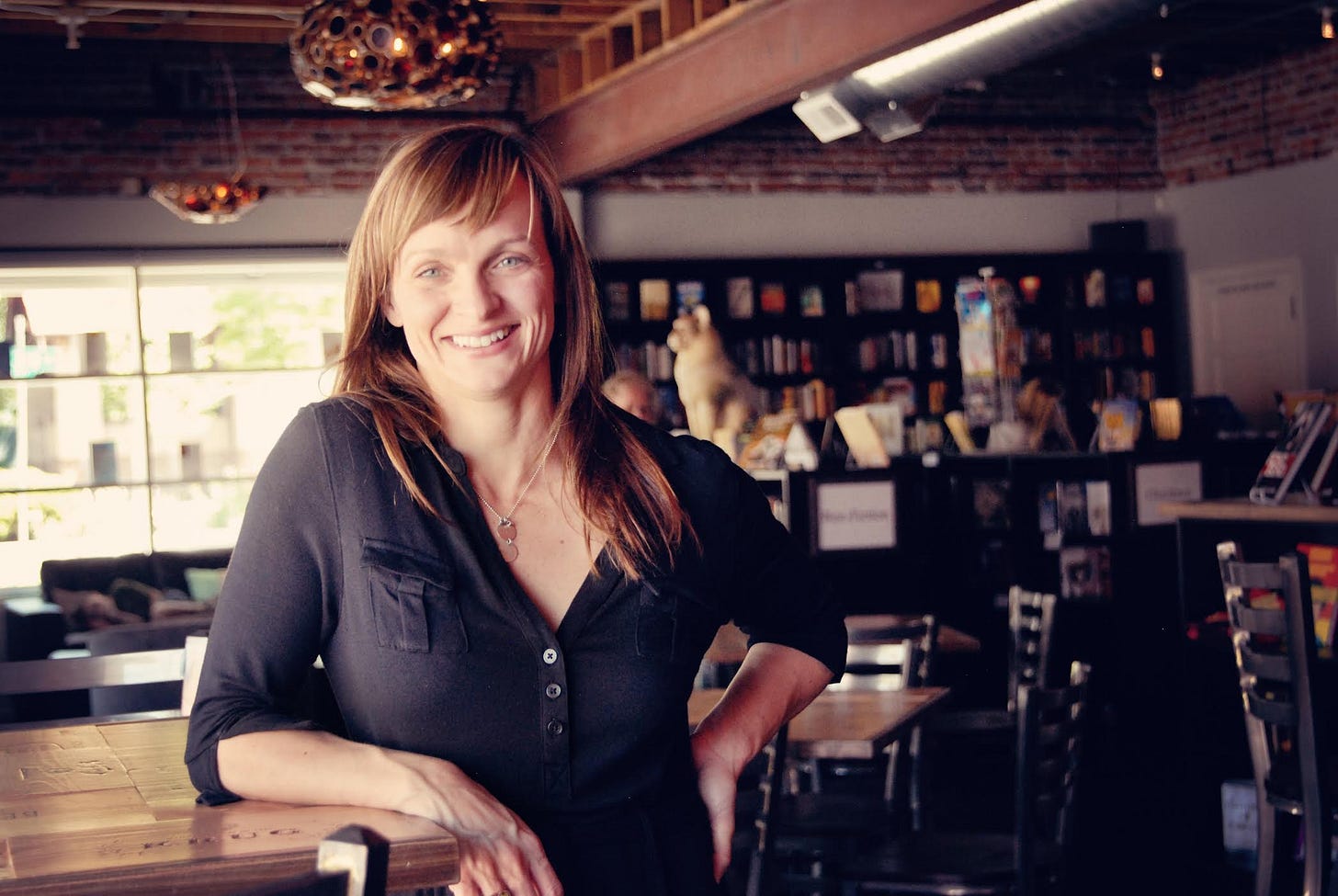
Free Speech and Readers’ Rights
The American Booksellers Association's descent into groupthink and censorship threatens independent book sellers and their customers
I grew up in a conservative Southern Missouri town without a bookstore, so I spent countless hours in our small library until a Barnes and Noble moved to town.. Soon, with access to more choices, my reading habits expanded into classic, contemporary, and literary fiction. I was exposed to different people, places, cultures, and histories in a deeper way than I would otherwise be at school. These stories inspired me to leave my town behind and explore the wider world. I know first hand that books and the freedom to read them can change lives and create seekers, explorers, and empathetic thinkers.
When I opened my first bookstore, BookBar (Denver’s beloved bookstore/wine bar hybrid) in 2013, the importance of book access was front of mind. Of equal importance was prioritizing free speech and readers’ rights. I took inspiration from Joyce Meskis, the founder of Tattered Cover. Meskis was known for her fierce defense of free speech. She believed, as I do, that the job of a bookseller is not to pass judgement, act as gatekeepers, or suppress customers’ book choices based on a bookseller's personal ideology, but to assist customers in finding the right book for them. I carried this philosophy to my next bookstore, The Bookies, which I purchased in 2021.
In the twelve years that I’ve owned independent bookstores, I have witnessed a massive shift in regard for free speech within the indie bookstore industry. During the first few years of my career as a bookstore owner, indie booksellers were a relatively cohesive group of underdogs who intuitively knew we were stronger together. Our unspoken contract with our communities was customer service, readers’ rights, and a steadfast dedication to free expression.
At that time, the American Booksellers Association (ABA), (the trade association for independent booksellers) staunchly defended this culture. When booksellers challenged the participation of author(s) at ABA events or requested the removal of marketing materials from distribution to bookstores, the ABA’s response was always a resolute defense of the First Amendment. We were reminded that the opinions of the minority would not determine the fundamental rights of the majority.
Few industries and institutions were untouched by the swift cultural upheavals of the past decade, however, including independent bookstores. Conversations about which authors to reject due to their political views or identities (or lack thereof) and accusations of various misdeeds became more commonplace. Even the physical destruction of books was cheered on by some of my fellow booksellers. Ibram X. Kendi’s assertion that “if you’re not antiracist, you’re racist” became the siren call many booksellers wielded to cull their titles and suppress publishers’ marketing efforts.
In response, the ABA revised its Ends Policies (formalized organizational expectations and goals) to prioritize its commitment to antiracism, inclusion, representation, and equity over that of free speech. Their stated position is that their commitment to diversity, equity, and inclusion (DEI) should be paramount to all their work, taking priority even over the First Amendment right to free speech, which the association now sees as conflicting with their DEI work. Specifically, the ABA asserts that the First Amendment’s protection of hate speech is at odds with the ABA’s role to represent and support all its members.
Since 1990 the ABA has leaned on its free expression initiative, American Booksellers for Free Expression (ABFE) to provide booksellers a voice in the fight against censorship with a mission to promote and protect free expression. This worthy mission has since been updated to assess whether a store’s free speech concern “...demonstrates a commitment to antiracism, equity, access, and representation.” Concerns that fall outside this focus will be referred to coalition partners better equipped to address their specific needs. In other words, stores’ free speech rights will only receive assistance from their industry association if the concern falls within the ABA’s commitment to DEI.
The ABA further infringed on its members free speech rights when the decision was made in 2021 to screen the “white box,” a monthly mailing that publishers use to distribute marketing materials to booksellers. The policy change was in direct response to the backlash the ABA received after a white box mailing included Abigail Shrier’s book Irreversible Damage: The Transgender Craze Seducing Our Daughters. This was one of the incidents that prompted ABA's Executive Director, Allison Hill, to issue an apology in which she described these mistakes as “terrible and racist harm” and “egregious, harmful acts that caused violence and pain.” According to the ABA's website, they now screen their mailings for “hate speech.” It is not clear who determines if publisher marketing materials meet the nebulous definition of hate speech or what criteria is being used.
The authors introduced to booksellers at ABA events, such as the annual Winter Institute industry conference, are also screened based on authors’ identities as directed by the ABA’s Diversity Statement. “ABA will: require representation of Black, BIPOC, queer, disabled, and other marginalized authors and books at all ABA events (at least 40% of speakers/panelists overall).” This requirement not only forces authors to announce and adhere to an identity they may not wish to amplify, but also unnecessarily promotes an author's identity over the quality of their work. The argument here is that by promoting historically marginalized authors, we promote diversity and inclusion. That is a fine mission for a literary social justice organization. However, for a trade association meant to represent independent bookstores across the U.S. in urban and rural locations—states both red and blue—it is necessary to prioritize the promotion of the authors our customers are most likely to purchase from our stores.
Since 2020, independent bookseller cohesiveness has been deteriorating, and booksellers are dividing along lines reflected in the five affinity groups that enjoy special event programming and dedicated networking. Furthermore, The ABA Code of Conduct for all Association Meetings and Events now encourages booksellers to report one another for perceived slights, sowing deep mistrust. “ABA recognizes that although some behavior may not be intended as harassment and may not be considered harassment by some, comments or actions that subtly and often unconsciously and unintentionally express prejudice against a marginalized group or a bias towards groups with the most power, also known as ‘microaggressions,’ can still have a negative impact and may prevent an event from feeling inclusive to all.”
What can booksellers do to encourage the ABA to return to a genuine commitment to readers’ rights? A store could protest the ABA’s policies by publicly canceling its membership, as mine did in 2022, but it would lose the many benefits of membership. The ABA provides many stores’ websites, and they rely on the marketing opportunities, educational sessions, and other support the ABA provides. The affiliate commissions member stores receive from bookshop.org more than make up for the cost of annual ABA membership dues.
Letter-writing campaigns have fallen flat and no longer receive responses. Some of my colleagues and I have written dozens of letters, pleading with ABA staff and Board members to reconsider their illiberal approach to supporting bookstore members. The responses we did receive were clumsy and erroneous justifications for suppression, repeating the aphorism that “a rising tide lifts all boats.”
One might think change could be enacted by remaining a member or joining the board to encourage more moderate and effective governance. However, the ABA now cautions prospective members to be aware of their commitment to antiracism, inclusion, representation, and diversity as outlined in their Ends Policies. One of the three requirements of board service is that the candidate “...should be committed to ABA’s mission and Ends Policies, and committed to working in a manner that demonstrates ABA’s commitment to antiracism, inclusion, representation, and diversity.” So, they seem to have adopted policies that ensure their DEI commitment remains impervious to any internal or external dissent.
It is in the best interest of authors, publishers, and customers to stand up to the kinds of censorship the ABA seeks to normalize. We need to move the needle back to a place that prioritizes art over idealism and the viability of our small businesses over activism. Independent bookstores, unlike our competitors, contribute to the economic vibrancy of our communities. Local authors and small, independent publishers enjoy a symbiotic relationship with indie stores where their books won’t be relegated to back corners or buried by algorithms. Readers are far more likely to discover their new favorite author or their next great read by leisurely perusing our shelves or chatting with passionate and well-read staffers.
During these tumultuous times when our freedom of speech is under attack from both the right and the left, it is imperative that institutions stand strong against the instinct to restrict speech that does not align with a particular political philosophy. Like any ecosystem, the collapse of one component puts the entire system at risk. After all, a rising tide can’t lift sunk boats.
We welcome you to share your thoughts on this piece in the comments below. Click here to view our comment section moderation policy.
The opinions expressed here do not necessarily reflect those of the Foundation Against Intolerance & Racism or its employees.
In keeping with our mission to promote a common culture of fairness, understanding, and humanity, we are committed to including a diversity of voices and encouraging compassionate and good-faith discourse.
We are actively seeking other perspectives on this topic and others. If you’d like to join the conversation, please send drafts to submissions@fairforall.org.

















Thank you. Once upon a time it was a point of honor for people who worked in bookstores and libraries to defend books and authors with unpopular views.
I was a consultant to the library world for 40+ years and a contributing editor, reviewer, and columnist for The Bloomsbury Review (TBR) for about 14 years. TBR was an independent book magazine focusing on small, regional, and academic presses in the US and Canada. Also, back in the day, I helped found and manage an independent bookstore in the Midwest before I moved to Denver in 1975. We were proud that we sold books that other bookstores would not have on their shelves, including bilingual children's books, authors representing the gay and lesbian communities at the time as well as self-published books with right- and left-leaning political slants.
I visited libraries and bookstores throughout the United States and worked with state and national professional library and book-related associations. Increasingly, I heard and saw good people, who wanted a better world, advocate for removing books considered unworthy from shelves and to censor their authors. I found it hard to relate to their concerns. I don't think silencing ideas improves the world.
I admit it can be a fuzzy line deciding to not acquire a book because of subjective issues such as "quality" or because a book does not fit the current collection development guidelines versus not agreeing with an author's POV. And I have witnessed my share of clashes between library users and staff over favorite (meaning old) books removed from the shelves to make room for the new. However what you describe, in my opinion, is different and not just about the practicalities of limited shelf space and the changing interests of readers.
Again, thank you.
Sooo....basically you're saying that an organization that can freely decide what it wants to adhere to is somehow lowering the standard by choosing to be inclusive? Ok Elon Musk. You sound exactly how he did when stating that the standards for being a pilot were lowered because DEI was something they believed in. Standards for art were not lowered because more people are being considered.
Just be honest and say you dont think everyone deserves a fair shot because people dont want to be called out for their terrible takes; takes that harm actual, human people. If someone chooses to be a part of the ABA knowing what they stand for, then it is disingenuous to suggest that their policies on inclusion harm the art form itself.
And honestly, if youre struggling to keep your stores open, then that is capitalism at work and people are speaking with their money.